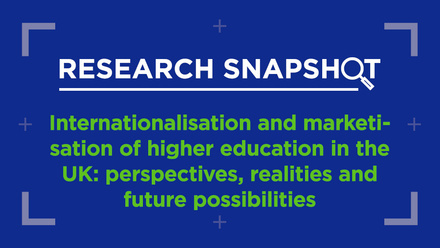Destination marketing: selling your university’s locale

Is your institution based outside of your capital city? Are you located in a country nobody can pin on a map? Selling your university’s location is an essential part of your conversation with prospective students. In today’s blog post, marketing professional Jemma Davies shares her top tips for ‘destination marketing’, an approach that promotes a destination (town, city, region, country) with a purpose to increase the number of visitors.
We’ve seen many tourism adverts enticing us to visit faraway places, but how do you integrate this with all the other great things you need to mention when speaking to prospective students? Read on for tips to overcome five challenges, which round out the destination marketing package:
Challenge 1: Being located outside of the capital city
I work at Birmingham City University, outside of one of the most famous cities on the planet – London. I’m one of the lucky ones, only a one hour and 24 minute train ride from the capital. With a population of around one million people, we’ve got a lot to talk about.
Tip: Work with your city marketing organisation
We work closely with Marketing Birmingham. They are working hard to put Birmingham on the map, so there is no reason why we shouldn’t ride their coat tails. They are usually the first to know about key city facts and statistics, events and news and they usually have a media library full of images and videos that we can repurpose for recruitment. If you don’t have a city marketing team, try your city tourism board to see what they can do to help.
Challenge 2: Being located in a country where English is not an official language
If you’re not located in the UK, Ireland, USA, Canada, Australia or New Zealand, you might just find yourself going up a steeper hill than most. Students automatically think they will have to study in another language so they look to English-speaking countries first. I previously worked at the University of Groningen, based in the northeast of the Netherlands, just over two hours from Amsterdam (Challenge 1 rings a bell here) and often had this conversation with prospective students.
Tip: Develop English content
Your website, your brochures, your pull-up banners, your e-mail communications, even down to the signage on campus – produce it in English. I don’t believe in completely wiping out your home language, but I do recommend doing enough to reassure prospective students they won’t feel isolated or in a position of not understanding. Speak to your current international students to see if you’re missing a trick with any areas, which would help future students.
Challenge 3: Being located in a country you can’t pin on a map
This challenge is closely linked to challenge 2. I’ve often found myself pointing to a map and estimating travel times for a student to understand where in the world the university is located. If students can’t identify with a location, it will prompt questions and cause doubt.
Tip: Sell the familiar
Talk about all the things that they will know about so it doesn’t seem so ‘different’. I have absolutely no doubt we’re all doing this already. Jumping in with some of the exotic assets of your location can come in at a later stage in the conversation. For the Netherlands, I was always referencing the number of bikes the country had (more bikes than people!) and how flat the terrain was.
Plot out travel times by train, plane and car from key capital cities and compare them against domestic locations so it doesn’t seem so far away. For example: London to Amsterdam is a one-hour flight, as is London to Glasgow.
Challenge 4: Being located in a city no one can pronounce
I experienced this at Groningen… Gro-nin-gen… A name I still have trouble pronouncing after living there for two years! For the locals, this won’t be a problem, but for your international students, they may feel a little silly when trying to pronounce an unusual name.
Tip: Embrace the challenges in pronouncing the name
There is no harm in joking about your unusual city/university name. Nine times out of 10, you’ll probably have a much more memorable conversation with your prospective students laughing about how hard it is to pronounce. I’ve had many funny conversations about Groningen where colleagues jumped in and shared tips with students and parents about how to say it. They’ll leave with a helpful impression about you too!
Challenge 5: Being located in a city/country with negative perceptions
Having worked in the Netherlands, conversation did sometimes divert to the ‘green stuff’ as well as the red light districts. Now that I’m working in the UK, I’m facing the challenge of Brexit and the sadness and scariness of the terror attacks that happened earlier this year.
If you’re located in a country which has iconic laws, or is experiencing some major political challenges at the moment, how can you address concerns which are beyond your control without directly bringing them up in conversation?
Tip: Wait. When the conversation allows, talk about it
There have been too many occasions when I’ve wanted to shout from the rooftops about a political decision I don’t agree with or to send a reassuring message to students. Until applications drop, offers are declined or enquiries come flooding in, I have to sit and wait. By pushing out a message, would it bring more attention to the topic?
I have loved the movement of universities standing together to say that ‘we are open’ with the recent political challenges that the UK and USA are experiencing at the moment. Having a stance as a university is a wonderful thing and will give you a frame of reference to work with if the conversation leads that way.
Destination marketing comes with a variety of external factors you just can’t do anything about. Some are good and some are painfully bad, but they shape your university’s story. Have patience, work with others and embrace your differences. After all, it’s all part of the experience international students are after, isn’t it?






